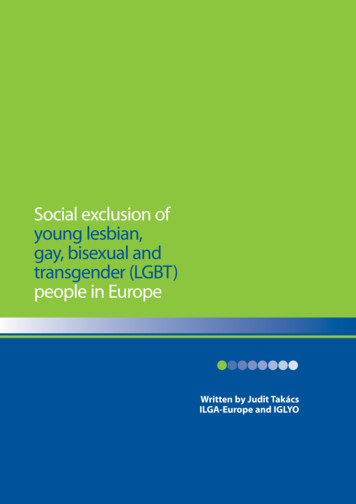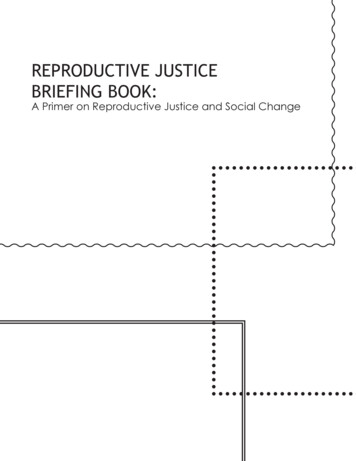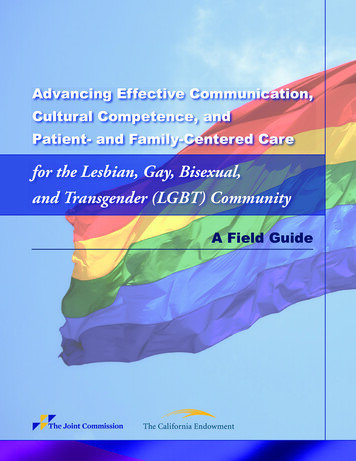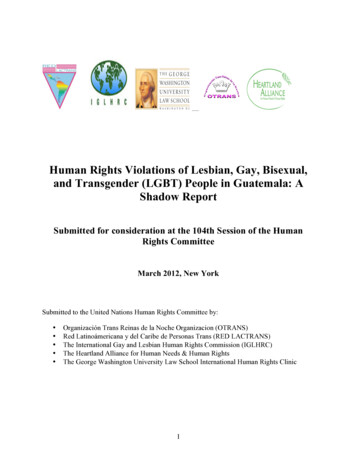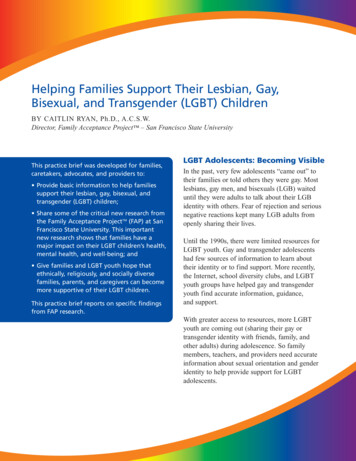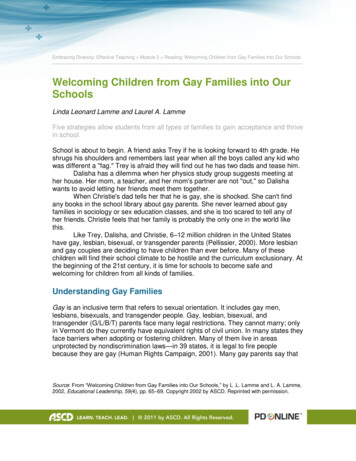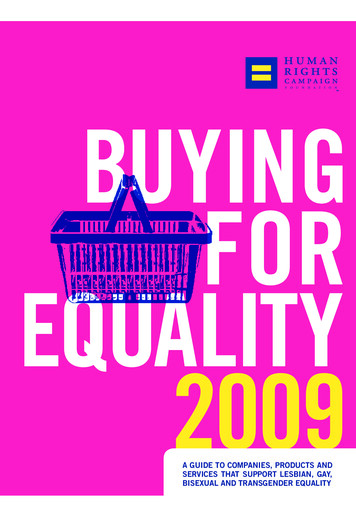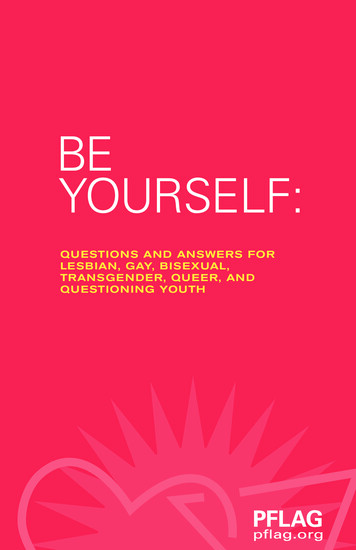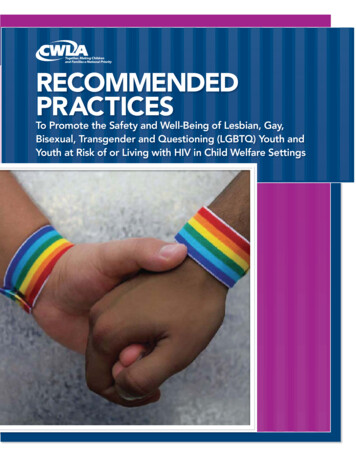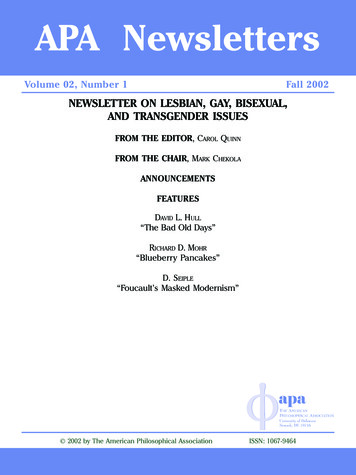
Transcription
APA NewslettersVolume 02, Number 1Fall 2002NEWSLETTER ON LESBIAN, GAY, BISEXUAL,AND TRANSGENDER ISSUESFROM THE EDITOR, CAROL QUINNFROM THE CHAIR, MARK CHEKOLAANNOUNCEMENTSFEATURESDAVID L. HULL“The Bad Old Days”RICHARD D. MOHR“Blueberry Pancakes”D. SEIPLE“Foucault’s Masked Modernism” 2002 by The American Philosophical AssociationISSN: 1067-9464
APA NEWSLETTERONPhilosophy and Lesbian, Gay,Bisexual, and Transgender IssuesCarol Quinn, EditorFROMFall 2002THEEDITORVolume 02, Number 1FROMTHECHAIRCarol QuinnMark ChekolaIn this issue, LGBT Chair Mark Chekola shares very importantinformation which came out of fruitful discussion at the AprilCommittee meeting in Chicago. Also included in this issueare three featured pieces. Though short, they are importantand interesting — and we even get a recipe for blueberrypancakes (I tried the recipe, and they’re great!). I would liketo take this opportunity to strongly encourage submissions ofitems to this newsletter; I would especially like to hear fromnew voices! Thanks.Since the Spring newsletter there are two main news items Iwould like to report. First, the Committee had a ver yproductive session at the Chicago APA meetings in April onissues related to publishing. It was decided to start severalprojects. One is to do a survey of how many LGBT-relatedarticles have appeared in journals which would be seen aslikely places for such articles from 1990 through 2001. We arepresently working on this survey, and plan to publish the resultsin the Spring, 2003 APA LGBT Newsletter. A second project isto collect reports of unprofessional referee comments. A thirdproject is to encourage networking by compiling a list of peopleand research interests. There are separate announcementsabout each of these in this newsletter.The second news item has to do with announcementsabout position openings. The Committee has been receivingsome announcements about position openings fromUniversities welcoming LGBT applicants. It was decided todistribute such announcements on an email list which hasbeen developed. (Anyone not on it who wishes to be cansend a request to be added to the list to me atchekola@mnstate.edu).Chris Horvath has just finished his term on the Committee,and we thank him for his participation on the Committee.Jacob Hale joins the Committee as of July 1, 2002, for a threeyear term. Hale served on the Committee for a one-year termwhen the Committee was established in 1998. We welcomehim back to the Committee.University of North Carolina at CharlotteContributions InvitedThe editor encourages contributions to the newsletter,especially essays that might fall through the cracks elsewherefor being untraditional in scope or content. Pieces may rangefrom opinion pieces to book reviews to short articles.Commentary on issues important to professional life —teaching, research, and service — are especially welcome.Early contact with the editor is strongly encouraged. The nextdeadline is February 1, 2003. Please contact Carol Quinn atDepartment of Philosophy, 9201 University City Blvd., Universityof North Carolina at Charlotte, Charlotte, NC 28223.Minnesota State University, Moorhead
— APA Newsletter, Fall 2002, Volume 02, Number 1 —Current Committee MembershipANNOUNCEMENTS(with last year of term listed in parentheses):ChairMark G. Chekola (2004)Department of PhilosophyMinnesota State University MoorheadMoorhead, MN 56563Email: chekola@mnstate.eduCommittee Members:Pamela M. Hall (2003)Department of PhilosophyEmory UniversityAtlanta, GA 30322Email: philph@emory.eduJacob Hale (2005)California State University, NorthridgeDepartment of Philosophy18111 Nordhoff Street – 8253Northridge, CA 91330Email: zeroboyjh@aol.comKelly Oliver (2003)Women’s StudiesOld Chemistry Building, #105SUNYStony Brook, NY 11794-3456Email: koliver@ms.cc.sunysb.eduJoseph Sartorelli (2004)Stanford Humanities CenterMariposa House, Stanford UniversityStanford, CA 94305-8630Email: jsart@quapaw.astate.eduKayley Vernallis (2004)223 East Calaveras StreetAltadena, CA 91001Email: kvernal@calsstatela.eduRalph N. Wedgwood (2004)Department of Linguistics and PhilosophyMassachusetts Institute of Technology77 Massachusetts AvenueCambridge, MA 02139-4307Email: wedgwood@mit.eduEx Officio:Editor of Newsletter on LGBT Issues in PhilosophyCarol QuinnDepartment of PhilosophyUniversity of North Carolina at Charlotte9201 University Blvd.Charlotte, NC 28223Email: cvquinn@email.uncc.edu1. APA LGBT Committee to Look at Issues inPublishingAt its session April 25 at the APA in Chicago the APA Committeeon LGBT Persons in the Profession discussed issues related topublishing, in particular with regard to submission of articlesto journals. The Committee had received a complaintregarding poor treatment by a journal reviewer, including whatappeared to be homophobic comments related to an issueraised in the paper submitted.People present at the session discussed concerns abouthow papers are refereed for journals, and reportedexperiences of unprofessional behavior on the part of referees,sometimes homophobic and sometimes not. It was decidedthat it would be valuable for the Committee to collect copiesof reports that people submitting articles have received whichthey have found to be unprofessional, particularly if they seemto involve homophobia. Copies can be sent to the chair of theAPA LGBT Committee: Mark Chekola, Department ofPhilosophy, Minnesota State University Moorhead, Moorhead,MN 56560. Fax (218)236-3097; email: chekola@mnstate.edu.The paucity of articles on GLBT issues in some appropriatejournals was also discussed. Since people present hadthemselves submitted papers to some of them it is known thatthe lack is not due to there being no such submissions. It wasdecided to do a survey of relevant journals. A list wascomposed, and people present volunteered to surveyparticular journals for the years 1990-2001 for the number ofarticles and discussion pieces on GLBT issues. After the datahave been assembled a report will be written, with the plan tosubmit it to the APA and publish it in the Spring, 2003 APANewsletter on LGBT Persons in the Profession.The Committee also received a proposal to encouragenetworking among philosophers, particularly with regard topeople seeking reviewers of articles they have written and areintending to submit for publication, prior to their submittingthem to journals. People present thought it would also be agood idea to have a list of people and areas they are workingon for general communication related to research. It wasdecided to do two things: (1) Invite people to send requestsfor possible such reviewers to the chair of the APA LGBTCommittee or one of the co-chairs of SLGP. That person wouldthen try to identify a reader. (2) Establish a list of people andwhat they are working on to foster more networking, as wellas to help identify possible reviewers.2. Send in Your Journal Referee Horror Stories/ComplaintsThe APA Committee on LGBT Persons in the Profession wishesto collect reports of comments by referees for journals to whicharticles have been submitted for consideration that you havefound to be homophobic, nasty or generally unprofessional.Send them to the chair of the Committee: Mark Chekola,Department of Philosophy, Minnesota State UniversityMoorhead, Moorhead, MN 56563 Fax: (218)236-3097; email:chekola@mnstate.edu.3. People Sought for Networking ListThe Society for Lesbian and Gay Philosophy (SLGP) and theAPA Committee on LGBT Persons in the Profession are seekingto establish a networking list. Its purpose is to enable people— 172 —
— Teaching Philosophy —to communicate about research. In addition, some peoplemay be seeking someone to review and give comments on apaper the person intends to submit for publication. Pleasesend your name, address, and email address to Wendy LynneLee, SLGP secretary: lamp@planetx.bloomu.edu.FEATURES4. Want a Reviewer for a Paper?The Bad Old DaysWould you like to find someone who can review a paper you’replanning to submit to a journal? The Society for Lesbian andGay Philosophy and the APA Committee on LGBT Persons areestablishing a networking list (see note in this newsletter aboutit). Be sure to submit your name and indicate your interests.In addition, if you send a request to one of the SLGP chairs orthe APA Committee chair, that person will try to help identify areviewer:David L. HullSLGP Co-ChairsRobert Hood rhood@frank.mtsu.eduPeg O’Connor poconnor@gac.eduAPA Committee ChairMark Chekola chekola@mnstate.edu5. APA LGBT Committee Session Planned forPhiladelphia APAThe APA Committee on the Status of LGBT Persons in theProfession will be holding the following session at the APAMeetings in Philadelphia in December, 2002. Check the APAProgram for details:Homosexuality and ReligionChair: Carol Quinn, University of North Carolina atCharlotte“Homosexuality, Islam and Human Rights,”Dana Flint, Lincoln University“Buddhism and Homosexuality,”Robert Hood, Middle Tennessee State University“Gay Christian Neo-Liberalism,”David Seiple, Union Theological Seminary6. Call for items for the SLGP NewsletterThe deadline for items for the Society for Lesbian and GayPhilosophy newsletter is September 15th. Any items of interest,including short articles, book reviews, teaching materials,announcements, and so on, are welcome. Please sendmaterial to Carol Quinn, Department of Philosophy, Universityof North Carolina at Charlotte, 9201 University Blvd., Charlotte,NC 28223, or by email to cvquinn@email.uncc.edu.d-hull@northwestern.eduSo the story goes, we are entering the Age of Diversity. We notonly acknowledge diversity but also praise it. The rise of gayrights has played an important role in this movement. Nolonger is toleration enough. In this short note, I recount myown experiences in academia with respect to the persecutionof gay people. We denounce Germany for its treatment of Jewsboth before and during World War Two. Even gay people havenow been added to this list. We were sent to the gas chamberstoo. But all that took place a half-century ago. Some arguethat we should just let it be. Others continue to demand thatthose organizations and even individual people whocooperated with the Germans and joined in the persecutionof the groups on Hitler’s list admit what they did and pay duepenance.Recently the head of the Max Planck Institute apologizedfor its duplicity in the Nazi regime. But where are theacknowledgments by universities and colleges of theirpersecution of gay people, not a half-century ago but a coupleof decades ago? Administrators and professors alike assumedthat gay people did not have the right to an education. Someuniversities and colleges (mainly religious) continue to holdthis view and act accordingly. I do not know and have no wayof knowing how typical my confrontations with academiaactually were. All I know is that I succeeded in avoiding thewrath of university administrators. Some of thoseadministrators are still alive. Some may still be active inacademia. It is about time they stood up to be counted.Gentlemanly silence is not good enough.I must admit at the outset that most of what I have to sayis based primarily on my own memories, and I am well awareof how unreliable memories can be. As I searched my waythrough old letters and occasional news clippings, I realizedeven more strongly how much our memories can mislead us.Hence, take the following narrative with a grain of salt. It is asaccurate as I can make it.In 1960, when I entered the Department of History andPhilosophy of Science at Indiana University, I heard rumorsabout a gay witch-hunt that had taken place several yearsearlier. A janitor had been upset by what was going on in themen’s room of the main librar y. When the universityadministration did nothing, he hid in the attic above the men’sroom and took photographs of the activity below. Instead oftaking these photographs to the administration, he passedthem around at a meeting of the Student Senate. So the storygoes, numerous students quit school. Whether or not theywere expelled, I cannot say, but a professor committed suicideby stepping in front of a car.In my final year at Indiana University, two male studentswere discovered having sex in a dormitor y room. Theadministration grilled them, trying to force them to namenames, the way that the members of HUAC used to do in thegood old days. These two students finally broke and gave thenames of eight other students whom they had heard weregay. No proof was required. A low-level administrator whowas also gay got a hold of this list and called my lover. Nowwas not the time to admit anything. The administration had— 173 —
— APA Newsletter, Fall 2002, Volume 02, Number 1 —no evidence. Dick called the others on the list and passed onthis information.I was the last to be interrogated. The administrator keptcircling the issue, while I pretended not to know what he wasafter. Finally, he blurted out that some of my friends had beenaccused of being homosexual. “My friends are my business.”He was somewhat taken aback. I was supposed to play theawe-shucks role. “But,” he continued, “birds of a feather flocktogether. You might get a bad reputation.” Once again, I repliedthat my reputation was my business. After mutteringsomething about the evils of sin, he dismissed me. Nothinghappened to any of us on the list. I do not know what wasdone to the two young men who had given our names in thefirst place.One puzzle at the time was Herman Wells, the long timepresident of Indiana University. It was widely believed thatthis much-loved man was gay. He lived with his mother and avalet of many years. What he did or did not do down throughthe years to protect students who were accused of being gay,I do not know. When he died a couple of years ago, none ofhis obituaries mentioned anything about his private life.In any case, I did get my degree, and twenty-five yearslater I was asked back to give a talk celebrating a quartercentur y of history and philosophy of science at IndianaUniversity (see Grau 1999). As the first student to receive aPh.D. in philosophy of science in the department, I wasexpected to reminisce about the good old days. Well, I didnot look back at my years at Indiana all that fondly. Theprofessors expected a lot from their graduate students andprovided very little in the way of direction or support. I alsomentioned that if the university administration had had its way,I would have been expelled from Indiana, and some of thoseadministrators might well be sitting in the audience.In 1964, I received a letter from the Department ofPhilosophy at the University of Wisconsin-Milwaukee offeringme a job. In those days you could be hired without aninter view. However, since the Philosophy of ScienceAssociation was meeting in Milwaukee that year, I took theoccasion to meet my future chairman, Dick Peltz. After a bitof small talk, I mentioned that I was living with another guyand intended to live with him the rest of my life. Dick wastaken aback a bit but replied, “That doesn’t make anydifference.”A year or two later, a friend who was a student at theMadison campus informed me that a gay witch-hunt wasunderway. Any student who broke under questioning was sentpacking with a note to his parents informing them that theywere sending their fairy son home. Of course, they did notput it quite so bluntly. My friend showed up for his inquisitionwith a lawyer. Suddenly the university realized that it mightbe sued, and the investigation was brought to a halt. At roughlythat same time, I was up for tenure. One of my fellowprofessors went to the chair to pass on the rumor that I wasgay. “Rumor? He told me that years ago.”In 1971, a couple of gay students at the University ofWisconsin-Milwaukee approached me about a universitypoliceman who was hanging around the men’s rooms oncampus in plain clothes, trying to lure students into making apass. When they did, he arrested them and turned them overto the administration. I asked for a meeting with the relevantadministrator to see if such things were actually going on inthe Age of Aquarius. They were. Although this assistantchancellor himself did not see anything wrong withhomosexual behavior, he also saw no reason to go out on alimb to protect gay students. After all he was jockeying tobecome chancellor. I pushed a bit harder, and he informedme that I was in no position to insist on anything, given therumors that were going around campus about me. “Rumors?I thought that everyone knew I was gay.” When I alluded tosome rumors going around campus about him, he decidedhe would do something. As a good administrator, he found away around this dilemma. He promoted the campuspoliceman to a desk job.That same year I asked to attend a meeting of theUniversity Committee of UWM to discuss the rights of gay andlesbian professors. Could the administration fire us at itsleisure? A couple of months went by, and I heard nothing.One day I met one of the members of this committee. I askedhim what had been decided. He replied that they had votedto expunge my visit from the minutes of the meeting and, incase I asked, tell me that they were not touching the issue. Ahalf dozen years later, I introduced a resolution at the UniversityFaculty Meeting to add “sexual preference” to its Policy onEqual Employment Opportunity. The only objection raised wasthat “sexual preference” might include necrophilia. Themotion was passed by a voice vote. A couple months later, onFebruary 15, 1978, Werner A. Baum, the Chancellor, sent out amemorandum informing the faculty and staff of this resolution.During the years that the advocates of women’s rightswere trying to get the Equal Rights Amendment ratified,numerous professional societies voted to meet only in thosestates that had ratified the amendment. The Philosophy ofScience Association was one of these organizations. I couldsee why a professional society might choose not to get involvedin political matters, but if discrimination against women wasa legitimate cause for our society to take action, I thought thatprotecting our gay members also called for some action.Granted, anti-sodomy laws were rarely enforced, but whenthey were, gay people were sent to jail. At the 1984 meetingof the Governing Board of the Philosophy of ScienceAssociation, I introduced a motion for our society not to meetin states with anti-sodomy laws. The motion passed butseemed to have no effect. We continued to meet in statesthat had anti-sodomy laws. In general, scientific societiesfound sufficient reasons to take action; philosophical societiesdid not. Why am I not surprised?Finally, last year, the Pacific Division of the APA in SanFrancisco passed a resolution stating that it would no longermeet in “states with anti-sodomy laws but no mitigating lawsprohibiting discrimination on the basis of sexual orientation.”At that meeting I participated in a session entitled “Before theEra of Diversity,” implying that we actually were in the Era ofDiversity. If the papers presented at this session showedanything, it was that we are not living in the Era of Diversityquite yet. One African-American philosopher participating inthis session told about his first APA smoker, where he wasasked to get some more chairs. An African-American studentin the audience volunteered that the night before, he had beenasked to do the same thing. We have come a long way, butwe have a long way to go.ReferencesGrau, Kevin T. (1999) Force and Nature: The Department of the Historyand Philosophy of Science at Indiana University, Catching Up withthe Vision, Supplement to Isis 90:S295-S318— 174 —
— Teaching Philosophy —Blueberry PancakesRichard D. Mohrr-mohr@staff.uiuc.eduIt all started when Bob and I were in our mid-thirties. “Winniethe Pooh” and “The House at Pooh Corner” came first. Thenwe read “Moby Dick.”We went back to pick up “When We Were Very Young”and “Now We Are Six” before moving on to “Remembranceof Things Past.” Proust’s “Giants in Time” took us twenty-twomonths. And we trudged through some history — Herodotusand Thomas Hobbes’s translation of Thucydides. But we gotbogged down in Gibbon and let that book fall before its Empiredid. After Proust, we figured we were allowed at least onepunt.We read a couple of Victorian novels, “David Copperfield”and my favorite, “Wuthering Heights.” I remember murmuring“perfect book” as Bob intoned its necromantic final lines inwhich the narrator contemplates the triple grave of Edgar,Catherine, and Heathcliff.We worked through some of the “queering the canon”literature — “Billy Budd,” “The Picture of Dorian Gray,” “TheYoung Torless,” and now, in our early fifties, we are readingMelville’s “Pierre.”It’s sometimes as little as a paragraph, sometimes as muchas ten pages. It is not every night, but nearly so. It is bedtimestory — our main daily ritual. Bob reads; I, with the “ConciseOxford” ready in hand, look up the weird words.Not on every Sunday, but nearly so, we have blueberrypancakes — and not just any blueberry pancakes. These areindustrial strength. To be palatable, they have to be preparedthe night before so that the buttermilk, egg-whites, and nutmeghave a chance to saturate the rolled oats. About fifty percentof the time, I drop the nutmeg stone into the batter as I sleepilygrate away. In the morning, Bob plucks out the stone beforeadding whole-wheat flour, baking soda, brown sugar, and agenerous packet of frozen blueberries, which we’ve preservedfrom the one Saturday of the year when berries appear bulkrate at our village’s Farmers Market. Fried at a low heat on acast iron griddle, the cakes take about fifteen minutes to cookthrough. I get the better part of the “New York Times” read asBob stands guard and flips. We save our pennies so that wecan top the cakes with real maple syrup. Hours in the making,they are savored in minutes. The work and wait stand to theeating as fasting stands to receiving the Eucharist. Houseguests get our Sunday morning ritual on any day of the weekthey chance to visit.Our daily and weekly rituals have been joined by annualrhythms as well. In the early years, we took separate vacations,but now we jointly organize our holidays around carefullyplotted trips to mountain lodges — masculine buildings inmasculine setting, the interface of manly Culture and manlyNature, or so the fantasy goes. We mockingly call theseadventures our Annual Teddy Roosevelt Memorial Treks. Theyhave included journeys to Lake McDonald Lodge in GlacierNational Park, The Grove Park Inn in Asheville, North Carolina,and, our favorite, Timberline Lodge on Oregon’s Mt Hood.Our rituals are not the glue of our relationship. Our loveis that. Rather our rituals are a way of placing worth on ourrelationship, to value it as beyond calculations of interest, wellbeing, and happiness.In their book “The Male Couple,” David McWhirter andAndrew Mattison report finding that in long-term gay malerelationships an aspect of the relation itself is frequentlyexperienced as a third element or ‘partner’ over and abovethe two men themselves. This third element is usually thefocus of significant investments of time, energy, care andconcern — a home, business, joint avocation, a companionanimal, or sometimes civic, political, or religious work. Thisexternal incarnation of the relationship relieves some of theconfining centripetal pressures frequently found in smallfamilies. But, I suggest, it does much more.The third element ritualizes the relationship. It is thevehicle by which gay men configure their relationships assacred, as having the same status in an individual’s personallife as divine worth has in the lives of the religious. Sacredvalues are those for the sake of which one stands prepared tosacrifice one’s interests and happiness in order both to ratifythem as one’s basic values and to establish them as a sourceof one’s identity and sense of self. A sacred object is one thatis priceless — one that is not for sale and is irreplaceable —even though its commercial worth may be precisely knownand its kind readily available. A few twigs of little or nocommercial value can become valuable beyond measure toa religious order through ritual. The rituals surrounding it alsodefine what the order is. Domestic rituals are the means bywhich the divine continuously dwells within our loverelationships even in an era without gods. They stamp onlovers the mark of who they are as a couple.And as too many gay men now have had to know, theyare two things more. They betoken the great sacrifices one iswilling to make for one’s lover when opportunity turns cussed,the material fabric of our existence wears beyond mending,and the cycles of life course their final wending. And there,beyond the last post, they provide the substrate and bridge ofmemory to the beloved.The Recipe: Bob and Richard’s Blueberry Pancakes— 175 —Mix together at least one hour before cooking, butpreferably overnight:1 1/2 cups old fashioned rolled oats (not the instantkind)2 cups buttermilk3 egg whites (no yolks)CinnamonSeveral dashes of cloveSome freshly grated nutmeg (the pancakes can absorbquite a lot of these spices to good effect)Just before cooking stir in:2 teaspoons baking soda (not baking powder)2 tablespoons dark brown sugar (or honey)1 cup whole wheat flourAbout 2 cups blueberries, fresh or frozenPreheat griddle or frying pan and brush with butter ormargarine beforeeach use. Cook on low heat. The pancakes will takeabout ten minutes onone side and five minutes on the other.Makes six large pancakes.
— APA Newsletter, Fall 2002, Volume 02, Number 1 —Foucault’s Masked ModernismA work in progressD. Seipledis3@columbia.eduMichel Foucault, the “Saint” of the Queer Movement, hasvirtually defined one style of postmodern criticism. He hasmade language an ally to power, and this has informed thestandard activist paradigm within Gay Philosophy. By whatFoucault called “genealogical” criticism, it’s deemed possibleto unmask the normalizing discourse that has been sooppressive to a great many of us. Then, like the Wizardrybehind Oz’s curtain, the regime of truth ontologically deflates,and its power is broken.However, at the philosophically interesting level, thisappears to reduce human relations to a play of power. Andsome — not all of whom are on the “other” side, politically —find this a pretty grim reduction, because it seems to imposeupon us a rather narrow range of self-referential categories.For what are we to make of the idea that radical politics is“not liberation but resistance” (Halperin, in Saint Foucault)?Isn’t there more to be made of oneself and one’s life, than justa paragon of queer transgression? Wonderfully interestingwriters like Halperin may be more complex than this, but evensuch a simplistic way of putting the issue does raise one ofthe basic questions of ethics, one that has really taken holdonly since Nietzsche and late Romanticism.For if the personal really is the political, is “resistance” allthere is? Is “resistance,” existentially speaking, enough? Notquite, says the Nietzchean — there is self-invention. But thenhere’s the rub: if one is only resisting, how can one create?Unless it involves more than mere transgression, resistanceto discourse is still controlled by the terms of that samediscourse. Notice here the ghosts of Isaiah Berlin and JohnStuart Mill rattling around this assumption — that all one hasto do is resist coercion.This might lead us to give up on Foucault altogether. Butthis would be a mistake, because it would be missing thepromise of Foucault’s later work. There, we notice two things:not only that there are multiple ways of describing anyinterpersonal dynamic, but also that some of the most fertilediscourses for that are precluded by the hegemonies we resist— which is why we resist them. We fight vehemently overlanguage — one of the contested sites these days is aroundthe term “terrorist” — and this is because we sense just wherethe power resides at our particular cultural moment. Moreover,the power of language lies in the ways it construes objective“truth,” and no construal has any power unless one subjectsoneself to the objectivity of the language game being played.So here then is the lesson of the later Foucault. Objectivity isat least partly a performative category, which cannot besimplistically dismissed in the way that postmodern rhetoricoften suggests.The question is not whether “objectivity” is reducible tototalizing hegemonic discourse — it’s not — but rather, whichobjectivist discourses still support autonomous self-reference.The outcome of any interesting human event is always afunction of the discursive power at work in self-reference, andit makes a difference which discursive categories are in playfor us. Foucault would say as well that it makes a big differencewhether we take seriously the “care of the soul” — for selfinvention is a matter of “subjecting” our selves to thediscourses most historically and culturally suited to our ownautonomy, which always employ the language of objectivity.Only by doing that will we ensure our own freedom.Here “freedom” becomes synonymous with an“autonomy” that cannot be reduced to merely “transgressive”impulses, because it constitutes, as Foucault mysteriouslydeclares, “the ontological condition of ethics.” This, I think Ican show, makes the late Foucault into a closet liberal — whichhas a real irony to it. Foucault’s preoccupation over the “careof the soul” did not appear much before his own death wasapproaching. Foucault himself, whose last college course wasdevoted to the classical practice of “truth-telling,” never got totell the whole truth about what he was up to. That leaves hiscommentator the odd task of constructing an intellectualbiography for the one who, as the “masked philosopher,” soconscientiously resisted the hermeneutics of authorship. Withhis own robust sense of irony, Foucault himself would probablybe laughing.— 176 —
David Seiple, Union Theological Seminary 6. Call for items for the SLGP Newsletter The deadline for items for the Society for Lesbian and Gay Philosophy newsletter is September 15 th. Any items of interest, including short articles, book reviews, teaching materials, announcements, and so on, are welcome. Please send
